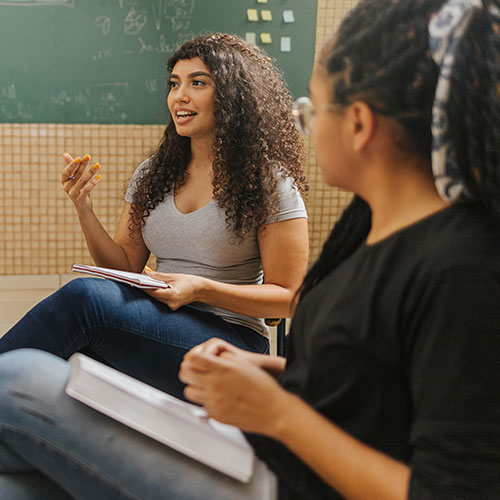TxSSC
Recognizing and Responding to Teen Dating Violence Toolkit
4.4 If Your Friend is in an Abusive Relationship

We may know that a friend is in an abusive relationship, but what is obvious to us is not to them. It is heartbreaking and frustrating. Whether our friend is the victim of abuse or the perpetrator of abuse, we must know what to do because most of us turn to our friends for support and guidance first.
“One of the best things we can do is listen.”

One of the best things we can do is listen. Even though we want to do everything in our power to get our friend to leave their partner, they may not be ready or want to end the relationship. By listening and not judging them, we are letting them know they aren’t alone. Abusers work to separate their partner from their family and friends to make them completely dependent on the abuser. There are many reasons why a victim of abuse doesn’t want anyone to know what they are going through. They may be embarrassed to be in that situation, not recognize it as abuse, deny they are being abused, or they aren’t ready to end the relationship.
Research has shown that the risk of homicide escalates when the victim of abuse decides to leave the relationship. The abuser may try to escalate their control and power to try to get the victim to stay in the relationship. Those around the victim, you included, can also be at risk of harm. Being aware of safety practices is important.
The following strategies from Love is Respect and Break the Cycle are suggested to support a friend who is in an abusive relationship:
- Be a good friend. Talk with them about what you have noticed and your concern about their safety. Tell them you are there to listen and help. Support them even if they don’t recognize or acknowledge the abuse. Focus on the behaviors, not the person.
- Ensure they know that abuse is not their fault. They deserve to be treated with respect.
- Recognize that all decisions are theirs to make. Everyone needs to make decisions that are right for them. Avoid judging them or their choices. Avoid threats to end the friendship because abusers isolate victims from their support systems. Be ready to connect them with resources when they are ready.
- Help them create a safety plan and ways they can be safe. For example, walking with them to class so they aren’t alone.
- Identify resources that can support them. If your friend is in immediate danger, their life has been threatened, or their life is at risk, consider calling 911. Remember that you are not a trained professional and if your friend is in immediate danger, it is important to reach out for help. If they are not in immediate danger, you can encourage them to talk with a counselor or trusted adult. You can talk with a trusted adult to get support and guidance. Be aware that things can go from bad to worse quickly.
Other things to know
- Never promise confidentiality. If we promise not to tell someone, we must either break our promise, or live with the consequences of not breaking our promise.
- Be willing to listen and allow emotional expression.
- Reassure them that help is available.
- Encourage them to talk with trusted adults. Parents, teachers, and other adults can help them figure out the best next steps to take. Offer to talk to someone with them so they don’t feel alone or scared.
- Avoid speaking poorly about their partner. It can push them closer to their abuser. They may make excuses for them or talk about all the good things the partner does.
- Remember to look out for your own safety too.
Love is Respect has a quiz to find out how ready you are to help, and questions to ask if you’re worried about your friend’s relationship.
Love is Respect created a guide to safety planning for teens. See Section 4.3 for more information on safety planning and resources.